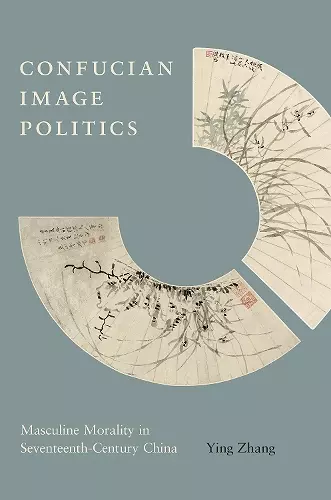Confucian Image Politics
Masculine Morality in Seventeenth-Century China
Format:Hardback
Publisher:University of Washington Press
Published:1st Nov '16
Currently unavailable, and unfortunately no date known when it will be back

Confucian Image Politics takes on one of the most complicated and controversial political conflicts in Chinese history: the factional struggles that rent the early modern imperial court. Zhang provides a finely nuanced and thoroughly researched analysis of the 'image politics'-a politics of Confucian moralism-that propelled the conflicts, providing both a persuasive revisionist history of a crucial moment in seventeenth-century history and a useful tool for the understanding of political conflict in China today. -- Cynthia Brokaw, author of Commerce in Culture: The Sibao Book Trade in the Qing and Republican Periods The research behind this book is absolutely first rate... Most often this story [of dynastic transition] is told from the point of view of the government, ... [but here] we come to see late Ming and early Qing literati through their own eyes, and in their own words and metaphors. -- R. Kent Guy, author of Qing Governors and Their Provinces: The Evolution of Territorial Administration in China, 1644-1796 A vast and erudite work. It encompasses a century in time and a cast of some hundreds of different scholar-officials... The author makes a significant contribution to the study of Chinese history. -- John Dardess, author of Ming China: A Concise History of a Resilient Empire
During the Ming-Qing transition (roughly from the 1570s to the 1680s), literati-officials in China employed public forms of writing, art, and social spectacle to present positive moral images of themselves and negative images of their rivals. The rise of print culture, the dynastic change, and the proliferating approaches to Confucian moral cultivation together gave shape to this new political culture. Confucian Image Politics considers the moral images of officials—as fathers, sons, husbands, and friends—circulated in a variety of media inside and outside the court. It shows how power negotiations took place through participants’ invocations of Confucian ethical ideals in political attacks, self-expression, self-defense, discussion of politically sensitive issues, and literati community rebuilding after the dynastic change. This first book-length study of early modern Chinese politics from the perspective of critical men’s history shows how images—the Donglin official, the Fushe scholar, the turncoat figure—were created, circulated, and contested to serve political purposes.
The open access publication of this book was made possible by a grant from the James P. Geiss and Margaret Y. Hsu Foundation.
"Zhang’s great strength is in finding new angles from which to tell the story of the late Ming . . . as well as strategic uses of the vernacular never before explored in a systematic way."
-- Katherine Carlitz * Journal of Asian Studies *"With its insightful observations and unique viewpoint, Confucian Image Politics is a major addition to the field of late imperial Chinese history. This book is essential to scholars interested in the study of gender history and political culture in the Ming and the Qing periods."
-- Haihong Yang * New Books Asia *"A masterful analysis of how the long-established practices of moralistic discourse and political conflict were intensified through the two actions of Yangming-inspired individual agency and the market imperatives of commercial publishing."
-- Kenneth J. Hammond * American Historical Review *"A powerful, highly original analysis of political discourse and factional struggle from the late Ming dynasty through the early Qing. This is outstanding scholarship, demonstrating an encyclopedic knowledge of primary sources from the seventeenth century. Professor Zhang combines sophisticated discourse analysis (refreshingly free of theoretical cant), with a close reading of high literati culture (calligraphy, poetry, memoirs), to provide an utterly fresh perspective on the politics of the crucial seventeenth century in Chinese history."
-- Matthew H. Sommer * China Review International *"This persuasive book will change the way seasoned scholars think about Ming-to-Qing factionalism. [This] very strong first book by an emerging leader in late-imperial Chinese history leads me to expect even greater contributions from her in the future."
-- Lynn Struve * Journal of Chinese History *"Masterfully demonstrates the unprecedented importance assumed by print culture in the image politics of the late Ming. This reviewer. . . is deeply impressed by the richness of this study and its analytical rigor and nuances, a result of the author’s masterful command of primary sources (many of which have been rarely explored by previous scholars) and her ability to weave a fascinating and compelling historical narrative about this important period. She has done a marvelous job in defamiliarizing several familiar issues in late imperial Chinese history, such as those of literati factionalism during the late Ming and early Qing imperial politics and the relationship between the Ming loyalists and so-called turncoats in the post-Manchu conquest era, by reexamining and reframing them from new angles and thus offering so many refreshing insights. Students and scholars of Chinese history, culture, and literature, as well as comparative historians, will benefit so much from the insights and information abundant in this study, not only because it is a well-researched scholarly monograph, but also because the author has so many fascinating stories to tell about this tumultuous period in Chinese history."
-- Martin W. Huang * Ming Studies *"Professor Zhang’s fine-grained study of how the many competing factions that rose and fell during the tumultuous years of the late Ming and early Qing deployed Confucian image politics complicates and defamiliarizes a political and cultural landscape that is central to understanding the late imperial period. Confucian Image Politics stands out for its first-rate close readings of a wide range of primary documents, methodological insights, and skillful storytelling that teach us how to read sources from this crucial period of fierce factional battles and whipsaw reputational changes."
-- Maram Epstein * Nan Nu: Men, Women and Gender in ChiISBN: 9780295998534
Dimensions: unknown
Weight: 658g
328 pages